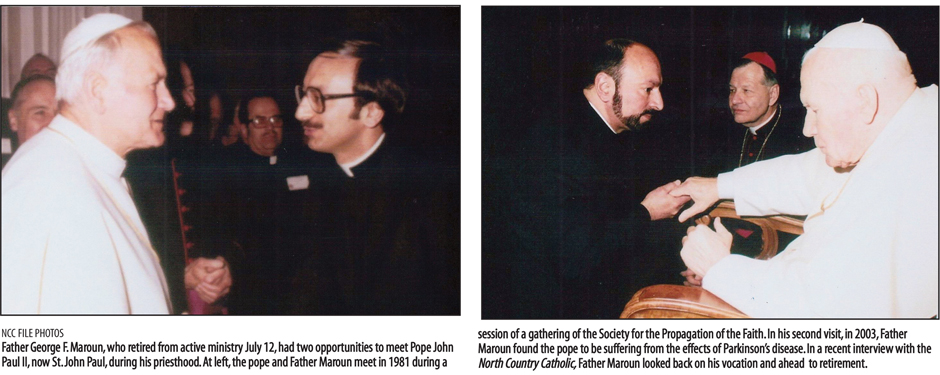July 22, 2015
By Dave Shampine CARTHAGE - He sees himself as a reconciler, and in that light, Father George F. Maroun is reconciled to the reality that with the health challenges he faces, he no longer can carry on his pastorate at St. James Church and St. Mary’s in Copenhagen, his mission for the past 13 years. “I can no longer function as I’d like to, and that’s not fair to the parish,” he said in a recent interview with the North Country Catholic. “I prayed about it and resolved that this is the right thing to do.” Last October, Father Maroun, who had just turned 66 on Sept. 25, and enduring the affects of Parkinson’s disease, took advantage of a visit by Bishop Terry R. LaValley to reveal his decision to retire. “I said I’d remain to the end of the fiscal year, and he was very open to it.” Although his retirement was effective July 1, Father Maroun remained in Carthage until July 12, allowing his successor, Father Donald F. Robinson, to enjoy some vacation time. A Tupper Lake native, Father Maroun is the youngest of four sons of Camil and Navie Moses Maroun. He began studies for the priesthood at Wadhams Hall Seminary, Ogdensburg, following his graduation in 1966 from Holy Ghost Academy, Tupper Lake, where he was president of his class of 28. He was a 19-year-old seminarian when his parents were both fatally stricken by heart attacks just ten months apart, in 1967 and 1968. He continued his work for his vocation at Christ the King Seminary, St. Bonaventure University, and on May 4, 1974, he was ordained by Ogdensburg Bishop Stanislaus J. Brzana. The following day, the new priest celebrated his first Mass in his home parish, St. Alphonsus Church in Tupper Lake. Father Maroun reflected on his life as a priest, giving some frank observations, during an interview in the community room which he saw renovated in the basement of 191 year-old St. James Church. The interview follows: What inspired you to become a priest? Do you have a favorite saint? You had been a priest about eight years when you were sent to do mission work in Mollendo, Peru, in 1982. Did you volunteer or get assigned? I was associate director of the missionary office, and since nobody else offered to replace him, I felt I should go. It was supposed to be for three years, but it lasted six. I was sent to evangelize them, but it was they who evangelized me. You see the face of God in the poor. Were you ready to come home in 1988 or did you want to stay? About the priest scandal, do you hold contempt for the offenders and their protectors? Would you change anything in your career? My focus is to bring people together. I see myself as a reconciler, a mediator. I think I’ve succeeded, but then it is frustrating when I don’t see those people returning to church. So I feel my mission has not been accomplished. I’m not here for personal gratification. I’m on a mission. Illness may have forced me to be more laid back. Do you ask God why he has allowed your health challenges, which in addition to Parkinson’s, have been some bouts with cancer? Speaking of that, you met with Pope John Paul, who suffered from Parkinson’s. In my second visit in February, 2003, the pope was suffering the effects of Parkinson’s disease. It was very sad to see him like that. How has your final pastoral assignment been? You have the Lebanese influence here. My grandparents are buried here, and I have shirt-tail cousins here. Where will you be in retirement, what will you be doing? This will put me close to my family in Tupper Lake (his brothers are Majeed, William and Camil Jr.) without being on top of them. And I’ll be near a good hospital, Adirondack Medical Center in Saranac Lake. I also hope to spend part of the winter with my first cousin, Father Richard George, at Fort Pierce, Fla. That’s in the Diocese of West Palm Beach, where (former Ogdensburg) Bishop (Gerald) Barbarito is. Editor’s note:
|
||||


